Almost There: Rachel Weisz in "The Deep Blue Sea”
 Sunday, March 8, 2020 at 10:00AM
Sunday, March 8, 2020 at 10:00AM In honor of Rachel Weisz's 50th birthday this weekend, we’re revisiting The Deep Blue Sea with a bonus entry in the "Almost There" series. Here's Cláudio Alves...
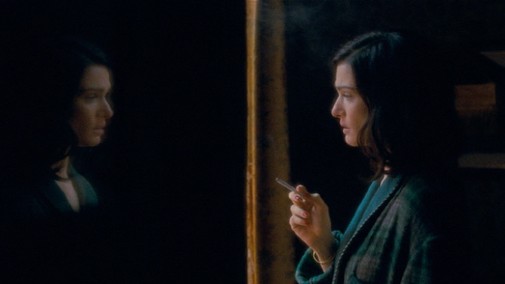
To portray depression compellingly is a great challenge for any actor. The danger in in authentic internalization is becoming a dull and an uninteresting subject for the camera, an unsolvable cipher. On the other hand, attempts at creating entertainment out of a depressed person is a good way to fall into the perilous pit of superficiality. Mental health issues are thus transformed into walls that block the audience's emotional investment or colorful quirks with no relation to reality. It's a difficult tight rope but some great thespians can walk it. More importantly, some can do it and make it look easy.
Such is the case of Rachel Weisz who came close to a nomination for Best Actress in 2012 thanks to her virtuoso work in Terence Davies' sad song of love and postwar despondency, The Deep Blue Sea…
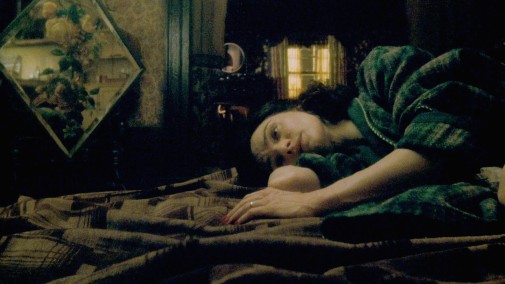
Sometime around 1950, London is a smoky carcass trying to rise from the rubble of war and shared trauma. Its streets are peppered with buildings left to ruin and lonesome figures, wandering with empty eyes. One such person looks on from a window when we first meet her. She's Hester Collyer, the wife of an honorable judge. Recently, Hester has left her wealthy husband in pursuit of a doomed love affair with a younger man. She's a woman but she's also England, a metaphor for a postwar nation and its persistence in face of despair. She's a symbol but she's a person. Hester's also suicidal.
Davies adapts the chronology of Terrence Rattigan's original play, conceiving something that's borderline impressionistic. We experience Hester's plight through memories, flashes of feeling and portentous omens, a linear story interrupted by the overflow of gloomy sentiment. It's a melodrama philtered through the perspective of a depressed person, saturated with smoke and hazy light, as anti-dramatic as it is poignant. In the middle of it all, Rachel Weisz must be a human anchor to the script's heavy themes and her director's bold stylizations. She must be woman and symbol, lovelorn heroine and a self-destructive creature.
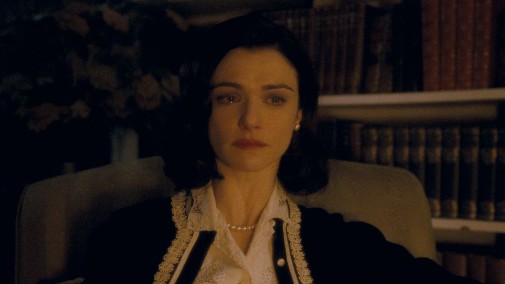
Weisz negotiates these different facets and never calls attention to her craft. From the moment we see her contemplate the street before attempting suicide, Hester is always an assured creation. If she's mysterious, it's because the film withholds from the viewer, preferring to immerse them in mood rather than bore them with blatant explanations. Still, even throughout its most oblique passages, Weisz never allows us to believe she's not in control of the characterization. Her Hester is a masterpiece of contained emotion, a psychological portrait painted with the faintest insinuation of an inner life rather than a thick brushstroke of drama.
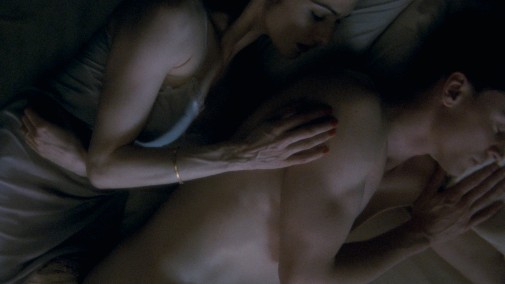
We get to know her through the barely contained irritation when faced with her mother-in-law's passive-aggressive jabs, through a tentative lick of lustful skin and the brittle apathy of a discontent spouse. We know her through the smiles she seems to force when at the pub with her younger lover, eyes fleeting about as if trying to deduce what's an appropriate reaction to her surroundings. In that merry setting, she doesn't look like a happy woman. She looks like someone trying desperately to be happy, playing the part of a happy person and half-convincing herself along the way.
Similarly, her romance is tainted by the foul taste of self-delusion. Hester loves her beau, she wants him, but that want and affection are barely more than abstractions. Still, she needs those abstract notions to have purpose, to feel something, anything. When she realizes he doesn't love her back, at least not as compulsively as she loves him, the wallop of sentiment is painful to watch. Weisz doesn't emote, so much as lets emotion drain from her face, the light dying behind her eyes. She's so great that it's difficult to imagine this particular film working with anyone else in the role.
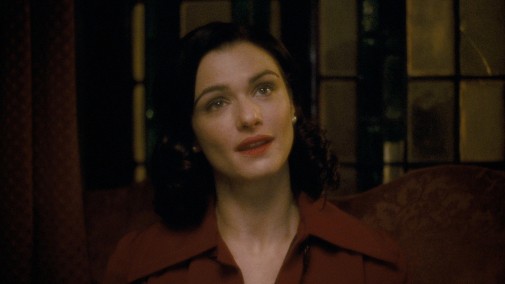
Other women have played Hester Collyer, including Vivien Leigh, but Terence Davies' version of The Deep Blue Sea feels incredibly specific to Rachel Weisz. The actress possesses both the discipline to deliver a masterclass on how to act out romantic depression, as well as the glamourous magnetism to make the subdued underplaying worth watching. Smoking alone in her flat, Weisz's Hester appears to be a diva of Old Hollywood transplanted into a half-remembered nightmare. She's a dream of glamour and a terror of postwar ennui. In many ways, she's the dark twisted twin to Celia Johnson's Laura Jesson from Brief Encounter.
However, while Johnson plays a woman searching for happiness, Weisz plays someone that seems incapable of recognizing happiness anymore. Joy is an impossibility for the discontent wife, a distant thing that's so unreachable one doesn't even have the energy to try and reach. Drowning, she struggles to breathe but never attempts to get off the water. She poured all that was left of hope into someone who didn't deserve it and now she's empty. Still, like England after the war, she perseveres and, amid all the horror, there's beauty to be found in that unshakeable quality.
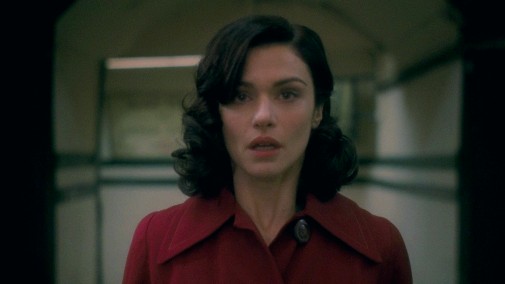



Reader Comments (16)
Terrific write-up!
She was robbed of that nomination. I remember she was so close after winning the New York Film Critic's prize and scoring nominations in several other places. Very disappointing especially considering some of the work that did get in, she would have been my choice to win.
Her work is so subtle and lived in. I've seen the Vivien Leigh version and while she is very good her interpretation is much more manic and keyed up. Rachel's more muted take fits the hopeless defeated place that Hester finds herself in.
I always found it utterly fascinating that her win from the New York Critics Film Circle came after two rounds of voting where she had not been nominated. As if, finally, the critics sat down to say, “Who are we kidding, none of these women hold a candle to Miss Weisz.”
It remains her only important critics’ group win, but with her resurgence, I also wouldn’t put it past the other two to join in before her career ends.
Thanks for the lovely read. Her Golden Globe nomination for this should’ve have been paired with at LEAST a BAFTA non, but alas.
Sometimes the best work is best left tucked away, for others to discover themselves without having been fussed over by countless of experts and their opinions.
I don't know why Watts or Wallis got the nod over Weisz.
Wiesz,Lawence,Riva,Cotillard,Winstead are my 5 in 2012.
This is Weisz finest hour, such an incredible work. I was so upset when she didn't receive the nomination. She should have been there with Close, Dunst, Theron and Swinton.
That would have been the 2011 line up this is 2012 were Chastain,Watts and Wallis took up 3 spots with Riva and Lawrence the favourites.
I already made my views known in the Cotillard commentary thread. It amounts to an insult that she did not get a nomination for her exquisite performance here. Only Riva's among the nominees, is in the same class.
Magnificent performance
Extraordinary performance. I truly believe if this film had a stronger profile and a later release (I think it was released in March), not only would Weisz had prevailed, but deserving noms for Production Design, Costume Design, and (maybe) Cinematography would’ve followed.
My favourite Almost There year is 1985. It was a very strong year for leading actresses: Meryl Streep, Geraldine Page, Jessica Lange, Whoopi Goldberg and Anne Bancroft. It was said Bancroft must have come in fifth, taking a spot that should have been for either Cher (Mask) or Norma Aleandro (The Official Story).
Cher and Aleandro shared Best Actress in Cannes, Cher was nominated for a Golden Globe and Aleandro took home Best Actress from the New York Film Critics.
They were both Oscar nominated in 1987. Cher was Best Actress for Moonstruck and Aleandro was nominated for Best Supporting Actress in Gaby: A True Story.
One of my favorite performances, and films. Everything works together in alignment of Terrence Davie's vision. I used to struggle with chronic depression and this film struck a nerve of mine; I used to watch it quite a bit. It's gorgeous and utterly depressing. Like a sad dream. Rachel Weisz is stunning and so talented. I'm happy she won the NYFCC award and got nominated for a Golden Globe for this. Even those feel like huge feats considering was a small, under the radar film this was.
A movie to watch
She definitely deserved the nomination over an 8 year old screaming "I'M THE MAN!!!".
Posterized!
I’ve seen 20 of her movies. I always feel a deep satisfaction watching her. She has a consistent level of high competency. She always makes the story make sense, she always drives the narrative briskly along, she always makes you interested in the character.
In many of her movies, she is the backbone of the film, and deserves tremendous respect. I’m also pleased when the movie shows how beautiful she is (eg. The Fountain).
I always liked her and supported her Oscar win, but this is the performance that really made me a fan. Such beautifully calibrated work.
The movie was released in UK in late 2011, n stateside in early 2012.
So she was snubbed by Bafta alongside Colman for Tyrannosaur in 2011, n by the Academy alongside Cortillard n Mirren in 2012